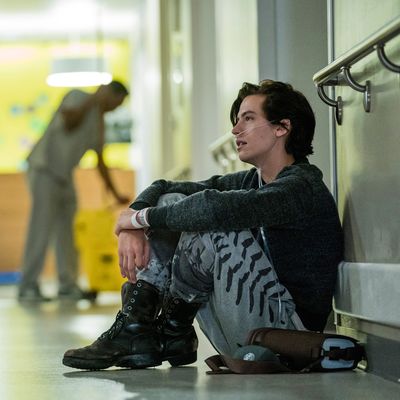
There’s no expiration date on teens imagining their own deaths in high dramatic fashion, but it’s hard not to feel as if the contemporary “sick lit” phase has run its course. The Fault in Our Stars came out nearly five years ago — ancient history to its target demo — and subsequent attempts to hop on the chronic illness bandwagon haven’t managed to come close to that film’s cultural impact. So here, in the year of our lord 2019, comes Five Feet Apart, and if it ends up being a late entry in the trend, it wouldn’t be a bad one to go out on.
Technically, Five Feet Apart can’t really be grouped into the “sick lit” genre, as it was never “lit” to begin with. The film is based on an original script by Mikki Daughtry and Tobias Iaconis. It tracks the aggressively tragic and impossible romance of Stella (Haley Lu Richardson) and Will (Cole Sprouse), two inpatients with cystic fibrosis residing at a hospital in an indeterminate American locale, who fall in love despite being forbidden to come within six feet of each other. (They bend the rules to make it the titular five, and do their best to get that number down from there.) CF patients can transmit infections between each other that can be fatal, and so even Stella and her long-time best friend Poe (Moisés Arias), despite having rooms down the hall from each other, primarily communicate over FaceTime.
When cynical, hot CF-er Will arrives, he and Stella initially clash — she’s got some advanced OCD tendencies and control issues, and he’s more pessimistic about his life expectancy. (He has literally put a handmade sign that reads, “Abandon all hope, ye who enter here” on his door.) Stella eventually gets him to take his treatment schedule more seriously, in exchange for Will being allowed to draw her portrait — a time-tested romancing technique. From there, of course, the two fall madly, maddeningly in love, carrying a pool cue between them on “dates” at the hospital, chastely undressing as they stare dewy-eyed at each other across a swimming pool. In the ranks of YA contrivances for why the two romantic leads can’t have sex, this ranks just south of Twilight. In both cases, nothing short of death and destruction is ensured by the hookup.
The story and Stella and Will’s eventual flouting of the distance rule is predictable, and probably wildly irresponsible as a model for real-life patients with cystic fibrosis. Of course “living life to the fullest” is expressed as a counterargument to not contracting a fatal lung infection. Of course their seen-it-all nurse, Barb (Kimberly Hebert Gregory), just doesn’t understand the power of their love. Of course someone close to them dies in the third act to really drive home just how life-and-death their situation is. Due credit then should be given to Sprouse and particularly Richardson for selling all of these reheated tropes to their full potential. Richardson, all messy hair and oversized granny sweaters and sickly glow, is as good as she always is, balancing her character’s anxiety and romanticism perfectly. The script saddles Stella with a rather sadistic amount of personal tragedy (CF is just the beginning), but she really digs into what that biblical level of sadness would feel like for a teen. Sprouse is more in CW mode, but he knows how to tell a girl she’s beautiful on screen for maximum theater-seat swooning, and it’s a surprisingly sense-making counterpoint to Richardson’s more realist performance.
The film’s finale is a veritable symphony of tragic ironies, so bent on punishing its leads that they can’t even mutually enjoy a first kiss without its serving a utilitarian purpose. And yet, if this is the logical conclusion of the ever-heightened hospital-gown teen romance, then it’s fitting for it to reach such operatic heights. This isn’t a genre about the illnesses that it features as much it is about the everyday feeling of all teenagers that their feelings will literally kill them. It lives in the agony of the space before you’ve even kissed someone, much less touched them — a longed-for hypothetical so mind-blowing that one can hardly imagine life continuing afterwards.

